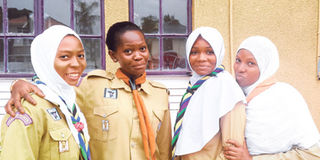Girl scouts redefine abilities

Zahara Kingalu, Rehema Ramadhani, Devina Adosi, Mwanahamisi Hussein and Heriet Komba pose for a photo outside the scouts offices in Dar es Salaam. Photo I Esther Karin Mngodo
What you need to know:
In four minutes, Mwanahamisi Hussein (18), Heriet Komba (20), Zahara Kingalu (21) and Rehema Ramadhani (18), are able set up a tent in the woods without the help of a man.
In four minutes, Mwanahamisi Hussein (18), Heriet Komba (20), Zahara Kingalu (21) and Rehema Ramadhani (18), are able set up a tent in the woods without the help of a man. This isn’t the only impressive thing they can do. They can climb trees, cross over one side to another by gripping a rope. And most importantly; they can adjust themselves to adapt to any life situation, and to offer support to those in need. Their abilities are endless; they can extinguish a fire, save those who are drowning, give first Aid and peer education in their communities. They have been doing this for years now, Mwanahamisi being the longest member among them – 8 years in total.
Is it for girls?
“Girls need to know that there is a remarkable difference between Scout Girls and those who aren’t Scouts”, says Rehema with a laugh. She knows that people think that if girls are scouts, they will be loose women because they constantly interact with boys. But she thinks that it is the other way round.
“It is because we interact with boys so much that we are empowered to make informed choices about our bodies. Actually, I always help other girls who aren’t scouts on how to behave around boys,” she says.
As a young girl training to become a nurse, Zahara has been empowered through training as a Scout. She says that she has great confidence in herself, a fact shared by all four girls. “Even when I am working in the wards, I find myself operating within the ethics of our training as Scouts – we have a duty (to perform) to other people. I am often asked by people, why am I not afraid of authority. People are often afraid of the police. I know that I am supposed to work with them and not fear them. Scouting has changed my perspective on this,” she says.
Heriet is currently a Form Five student at Jitegemee High School where she takes Geography as one of her subjects. She explains how Scouting has helped her improve in her studies, “As Scouts, we learn about life in nature.
I see what I learn in class vividly in nature. I have also learnt how to manage my time, since we are always timed in the tasks that we are given.”
On her side, Rehema testifies that she can now manage the house when her mom is away. “It has helped me do things quickly. I can manage time well. I can walk and save money. I am not lazy. And it has made me courageous. I am not afraid of men. Whatever task given to them, I can perform it as well, even better. I am a strong woman,” she says.
Assistant Chief Commissioner (Camp Sites), Devina Adosi, explains that The Scout Association was founded in 1907 by Robert Baden-Powell, a lieutenant-general in the British Army.
“Try and leave this world a little better than you found it and when your turn comes to die, you can die happy in feeling that at any rate you have not wasted your time but have done your best.” – is one of his famous words. This is why Scouts are taught how to care for others and for themselves – and how to become better people in their society.
As it was at the beginning when Scouts was founded, Devina says that they are soldiers with no intention of fighting or being easily recognized. She explains that there are four Scout groups based on age groups namely, Cub Scouts (6 – 10 years), Junior Scouts (10 – 15 years), Senior Scouts (16-17), Rover Scouts (18-26 years) and Scouts (27 and above). To become a scout, students can join the Scouts club in their school or join one nearest to their locality. Adults can also apply by registering at a Scouts office near them.
The Invisible Army
We are invisible, says Rehema. She explains that whenever you see a tragedy being reported on the news, the Scouts were probably there but no one thought to mention their contribution.
Zahara recalls in 2014 when people living in Jangwani swamp were affected by floods and relocated to Azania Camps. She was one of the Scout members who volunteered to help them at their time of need. She says they were able to save many lives and also assist in maintaining order at the Camp site.
“Be prepared” is what they keep saying to each other concerning any situation that they encounter. Devina explains that a Scout will never be stranded or unable to know what to do in a situation because they are trained to always be prepared. One of the things that most Scouts will carry with them is a scarf, even if it won’t be around their neck, it sure will be with them somewhere. A Scout can use this ‘neckerchief’ as a bandage in case someone they encounter is hurt. It can also be used as a dust mask, a sling, a napkin, a bib or a signal flag. They are governed by 10 Principles that reflect on their role to other people and to themselves.




